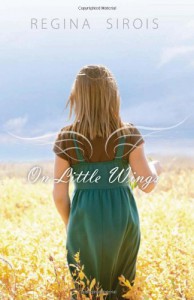 Jennifer grew up believing that her small immediate family was all she had, until one day she discovers a photo of a woman who looks remarkably like her. This is her aunt Sarah, her mother's sister. When her mother won't tell her why they are estranged, Jennifer calls Sarah and then insists on visiting her in Maine for the summer. Family secrets, lost heritage, all that good stuff.
Jennifer grew up believing that her small immediate family was all she had, until one day she discovers a photo of a woman who looks remarkably like her. This is her aunt Sarah, her mother's sister. When her mother won't tell her why they are estranged, Jennifer calls Sarah and then insists on visiting her in Maine for the summer. Family secrets, lost heritage, all that good stuff.I enjoyed the family secrets aspect of the story. Family secrets, in fact, are probably my number one appeal factor as a reader (which is why I love Melina Marchetta so SO much and the book The China Garden and Sarah Ockler and a million other things). The story even has some sweet parts, like the description of the coast and the nightly ritual of reading lines that reminded me of a Madeleine L'Engle story, which is a very high compliment. I also really enjoyed the theme of both leaving and returning to home.
However. On Little Wings has probably the most overt sexism I have read in a contemporary YA novel, like, ever. There is a big blow-out scene involving the romantic interest and his sixteen year old sister and her boyfriend that totally, 100%, no going back, turned me off to the romance in the book. Usually when we see such crazy possessive, objectifying of a girl(s) in a YA novel, it's the story of an abusive relationship. And man, if the novel hadn't ended I could totally see it going there. But to all the characters, it was normal. IN FACT, Jennifer's mother saw ONLY THIS PART of the romantic interest, Nathan, and said, "he seems nice." Uh, no mom, he doesn't. I didn't really buy in to Jennifer being that interested in him either though she says it a lot; I didn't feel it. I wonder if she pursued it all in an attempt to have just any kind of love story to tell, an idea that the novel supports quite a bit, actually.
I look forward to discussing this with book club.
P.S. I wondered, as Nathan's treatment of women emerged, if the author was LDS. I just looked it up, and she is.
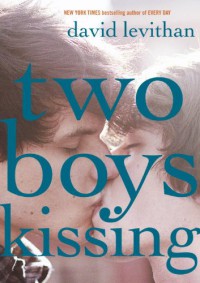 I am a character reader and David Levithan can be such a concept writer that I don't quite connect to about half of his books (even though I always really want to!). This is one of them. The concept is great, and some of the writing was wonderful but it's just so removed from the characters, I felt like I didn't get to know any of them.
I am a character reader and David Levithan can be such a concept writer that I don't quite connect to about half of his books (even though I always really want to!). This is one of them. The concept is great, and some of the writing was wonderful but it's just so removed from the characters, I felt like I didn't get to know any of them.The one character I did eventually end up connecting with was the collective gay men's chorus. I think this connection was made more my me associating the narration with other stories though, like the FABULOUS movie Beginners and the heartbreaking story of Beauty and the Beast lyricist Howard Ashman's death from AIDS in 1991.
I do think teens will really like this book, particularly for the emotional, poetic style of the narration.
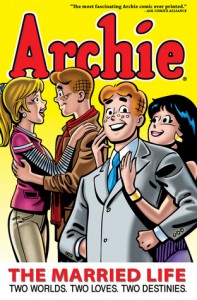 This series is crazy!
This series is crazy!If you want to read about Archie and the gang having real adult problems, this is your stop. Moose is in anger management, Archie and Veronica have marriage problems, Chuck is jealous of Nancy's comic book success, Reggie can't hold a job, and Midge is dating... Jughead?
These are just some of the bizarre real life situations in either the Archie Marries Veronica OR the Archie Marries Betty alternate realities.
This comic book took me much longer to read than I expected because it is an actual continuous graphic novel and not just Archie shorts, and I really enjoyed it.
 Some of these essays are much better than others. I particularly liked "A Friend Sits on the Hitchin' Post," though I had been to at least two friend weddings before I was 21 (and several more by 23), and I only now wonder if that's really unusual.
Some of these essays are much better than others. I particularly liked "A Friend Sits on the Hitchin' Post," though I had been to at least two friend weddings before I was 21 (and several more by 23), and I only now wonder if that's really unusual.
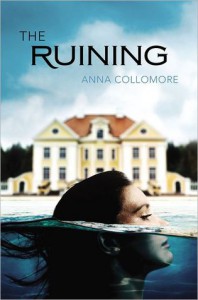 I tried to forgive this book its many faults. I can be a nit-picky reader at times. When Annie describes watching Detroit fade away as she flies out of DTW and I thought, "I've flown in and out of that airport dozens of times heading to or coming from the west and have never seen the city from the airplane," I try to forget that. And when Annie is surprised to read "The Yellow Wallpaper" in the feminist literature section of her lit survey as though it is not the starter short story for reading feminist literature, I tried to forget that too. And again when the story really heavy-hands it with the yellow wallpaper parallel. But...
I tried to forgive this book its many faults. I can be a nit-picky reader at times. When Annie describes watching Detroit fade away as she flies out of DTW and I thought, "I've flown in and out of that airport dozens of times heading to or coming from the west and have never seen the city from the airplane," I try to forget that. And when Annie is surprised to read "The Yellow Wallpaper" in the feminist literature section of her lit survey as though it is not the starter short story for reading feminist literature, I tried to forget that too. And again when the story really heavy-hands it with the yellow wallpaper parallel. But...The Ruining had a shaky start, but it did have an interesting middle. By chapter thirteen, I had figured out what turned out to be the big reveal, but was still interested in Libby, the mom that Annie nannies for. She obviously is trying to control Annie, but to what end? If she is making her go crazy, how exactly is that? I thought she must be drugging her in someway. After Annie is poisoned by the nutmeg in the banana bread, I think the story goes off the deep end (PUN INTENDED). Annie has moments of lucidity as she spirals toward the crazy house, but none of it makes sense or is even emotionally believable. We are told that she works long hours, has to skip class, doesn't get enough sleep, but also that Libby is great and is the only person who cares about Annie. None of this is actually shown in the story's action. And how is Libby controlling Annie's phone? That part is never explained.
I also found the love interest compelling through the first half of the book, but after that he seems to exist for a kind deus ex machina. He will save you Annie! He doesn't have to move after all! He's rich and you can live with him! He loves you! He will talk to the shrink and the shrink will suddenly become not-a-villain! And he can computer hack away all your plot problems!
"'You're forgetting that I'm an expert when it comes to computers,' Owen said. 'I can hack into almost any system.'"
 So okay, I had no idea what Maggot Moon was about before I started reading it. I just knew people liked it a lot. So as I was reading I kept wondering how much of it was based on real history. I mean, it certainly sounds like Standish is living in a Soviet occupied country. But I was reading it in the middle of the woods on a mountain with no data service for miles, so I just had to finish the book instead. And while it becomes apparent that the Motherland is not exactly the Soviet Union (the president is female, for one), it's so close I think this book really does something for the genre. I mean, dystopic fiction got its start because lots of that crazy totalitarian stuff was really happening in communist and fascist countries. It still happens in places like North Korea, but I don't think people really think of it that way. They see this new crop of YA dystopia as futuristic speculation, as cautionary tales maybe, as alarmist even. But Sally Gardner takes her story and sets in the past, in a place so startlingly recognizable you can't ignore it. These terrible things, they REALLY HAPPEN.
So okay, I had no idea what Maggot Moon was about before I started reading it. I just knew people liked it a lot. So as I was reading I kept wondering how much of it was based on real history. I mean, it certainly sounds like Standish is living in a Soviet occupied country. But I was reading it in the middle of the woods on a mountain with no data service for miles, so I just had to finish the book instead. And while it becomes apparent that the Motherland is not exactly the Soviet Union (the president is female, for one), it's so close I think this book really does something for the genre. I mean, dystopic fiction got its start because lots of that crazy totalitarian stuff was really happening in communist and fascist countries. It still happens in places like North Korea, but I don't think people really think of it that way. They see this new crop of YA dystopia as futuristic speculation, as cautionary tales maybe, as alarmist even. But Sally Gardner takes her story and sets in the past, in a place so startlingly recognizable you can't ignore it. These terrible things, they REALLY HAPPEN.But that's not all! Standish is such a great character. He is well-drawn, intelligent and brave and also dyslexic. The story is crafted in this fantastic loop, and it's complemented by these disturbing illustrations of a fly's life cycle, including the rat whose poisoned corpse becomes the home for growing maggots.
This is some serious, complex storytelling. You should read it.
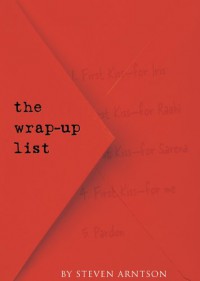 The Wrap-Up List has basically the same premise as Shaun Hutchinson's 2010 novel, The Deathday Letter, which is that sometimes people get letters telling them they are going to die, and the main character is one of those people. Steven Arntson takes this in a completely different direction though, one that is lighter, younger, less serious, and less funny. *not that there's anything wrong with that.*
The Wrap-Up List has basically the same premise as Shaun Hutchinson's 2010 novel, The Deathday Letter, which is that sometimes people get letters telling them they are going to die, and the main character is one of those people. Steven Arntson takes this in a completely different direction though, one that is lighter, younger, less serious, and less funny. *not that there's anything wrong with that.*The Wrap-Up List is a cute story that is easy to recommend to younger YA readers. It dances on the surface of the idea of knowing when you will die and that it will be tomorrow, but there's no real depth explored here. Gabriela, the MC, doesn't believe that she will die. She knows she will get her "pardon," a convenient way out of death (not present in The Deathday Letter), and it's no surprise at the end when she does and the whole story ends happily, with a lot of kisses and a silly dance party.
 I want to read this entire series RIGHT NOW, please.
I want to read this entire series RIGHT NOW, please.So much crazy stuff happens in The Dream Thieves that I feel like I can't talk about it without spoiling everything. Must... make... book club... read it...
 Just when I think I'm done with post-apocalyptic/dystopic YA, they reel me back in.
Just when I think I'm done with post-apocalyptic/dystopic YA, they reel me back in. It's the old story of kids get a disease that grown-ups don't get, kids that live get superpowers, kids are rounded up by a terrified government and put into "rehabilitation camps," one kid survives by pretending she's something else, kid gets "rescued" by a "liberating" organization, kid escapes from them and ends up with a group of other kids looking for... something.
What I really appreciated about this story was the first-hand account of the disease-caused teen apocalypse. We see a lot more stories of kids who are a few generations into the ruined world, but for Ruby, this happened to her when she was ten. She was in a camp for six years. So, when she gets out she basically still doesn't know what's going on and her primary motivation is fear. As a reader, you are learning about this world alongside her.
The supporting cast is awesome (Zu! Chubs [my fav]! Liam [the apocalyptic Augustus Waters]!), and Ruby is super smart if a bit naive and insecure. Like a real teenager! Her powers are unusual, but she's not a prodigy. She manages to save the day and then fail big time. She both under and overestimates herself. All the unfolding of plot and characters that happens in this story is really quite terrifying. The romance is sweet; it's secondary to the plot but I didn't find it boring. There was a period in the book that I was worried, like REALLY worried, that is was getting into creepy love triangle territory (see Shatter Me and Enclave) but girlfriend wised up and I actually said out loud at one point, "yes! good girl." I totally talked to this book throughout my listening experience, actually.
And finally, the narrator of this audiobook was amazeballs. I loved her, she had me totally captivated. I laughed, I cried, I screamed at them to run, I was loathe to get out of my car. It was one of those great audio experiences that really enhanced the story. Thanks Amy McFadden!
 I might end up liking this book more than three stars depending on how long it stays with me. Jersey Girl is a short novel and a really quick read and, to be honest, I picked it up because it was mentioned in an article about sexy-times in young adult literature.
I might end up liking this book more than three stars depending on how long it stays with me. Jersey Girl is a short novel and a really quick read and, to be honest, I picked it up because it was mentioned in an article about sexy-times in young adult literature.Angel is 17, and unlike her BFF Inggy, she doesn't have big ambitions about her future adult life. She just wants to hang out with her friends, have her boyfriends, and enjoy being a teenager. But maybe it's time Angel grew up just a little.
Jersey Angel is a very frank and honest novel. Angel makes mistakes and keeps making them and wants to do better and then says, "well, maybe one more time." How true. Her friend Sherry's pregnancy is dealt with so matter-of-factly, in a way, actually, I see teens in my library dealing with their/their friend's pregnancies. Then when the baby is stillborn, all those scenes are so heartbreaking. It was like, 2AM when I finished the book, but I cried and cried at Sherry's grief for losing something she never really wanted in the first place. I've never read a YA book that deals with this issue, and I think that's what's going to really stay with me.
 Whoa.
Whoa. I'm a pretty big Meg Gardiner fan, but had this book sitting on my shelf unread for some time. It was seeing her new one out that spurred to finally read it already. And oh man. Ransom River is so twisty and delicious, with great family secrets (one of my fiction sweet spots) and crazy, complex relationships (another one).
Forget it Jake, it's Chinatown.
 Poor Harry. It my personal opinion that this is the most difficult Harry Potter book. It's the most political, the most emotional, and we get, of course, the first truly heartbreaking death in the series (not that I didn't like Cedric or anything). That moment at the end where Harry tries to call to Sirius through the mirror gets me every time.
Poor Harry. It my personal opinion that this is the most difficult Harry Potter book. It's the most political, the most emotional, and we get, of course, the first truly heartbreaking death in the series (not that I didn't like Cedric or anything). That moment at the end where Harry tries to call to Sirius through the mirror gets me every time.
 At the Irving School, the Tragedy Paper is the big senior project, in which students are required to define tragedy and discuss it in terms of some literary work. At the Irving School, incoming seniors are greeted with treasures left by the previous occupants of their dorm room. At the Irving School, "randomly-selected" seniors plan and host an elaborate game that is both a way of sending out their class and setting up the junior class to continue the tradition. At the Irving School, a curse forces one maimed student per class to leave before graduation. At the Irving School, there is donut day, and sandwich snow days, and breakfast for dinner nights and bulldog t-shirts. This house of cards is the story of The Tragedy Paper.
At the Irving School, the Tragedy Paper is the big senior project, in which students are required to define tragedy and discuss it in terms of some literary work. At the Irving School, incoming seniors are greeted with treasures left by the previous occupants of their dorm room. At the Irving School, "randomly-selected" seniors plan and host an elaborate game that is both a way of sending out their class and setting up the junior class to continue the tradition. At the Irving School, a curse forces one maimed student per class to leave before graduation. At the Irving School, there is donut day, and sandwich snow days, and breakfast for dinner nights and bulldog t-shirts. This house of cards is the story of The Tragedy Paper.Duncan is starting his senior year and he inherits the room of the novel's hero, Tim. Tim has left as Duncan's treasure a set of CDs narrating his personal "tragic" downfall of the previous year. Most of the narrative is Tim's; Duncan only interjects here and there to mention either how caught up he is in the story or how he doesn't really want to listen to the story. But Tim's story is supposed to provide the meat of Duncan's Tragedy Paper, so Duncan keeps listening.
There is a huge build up during the book as to what the tragedy from the previous year was. It in some way involved both Duncan and Tim and was, we are led to believe, the worst thing to ever happen. When we finally are told what it was it's a bit anticlimactic. I'm also not really convinced it was a tragedy.
And this is the main problem with this book. For all its waxing on about the Tragedy Paper, it never really comes up with its own definition of what a tragedy is or what exactly the tragedy of Tim's story is. We get instead the repeated words "magnitude" "tragic flaw" "calm, chaos, calm" and we are told that Duncan thinks about them a lot.
At the point where Duncan proclaims that Tim's tragic flaw is that he didn't believe in himself I... well, I had that feeling of wanting to throw the book across the room, but I was listening to it in my car, so I couldn't. If Tim's tragic flaw is that he doesn't believe in himself, then I guess the tragedy is that he doesn't get to hook up with the Manic Pixie Dream Girl he likes, or maybe that he couldn't find someone else to hook up with instead. What really happens is that Tim, an albino, ignores increasingly serious symptoms of his eye problems until he goes blind while sledding down a dangerous hill with his MPDG and almost gets her killed. Duncan's role is that he was there. And the tragedy is... that Tim went blind? That the girl got hurt? That he never got to hook up with her? For most of the book, Tim is more a pathetic character than a tragic one, so right at the end the author throws in a detail giving him some fault in the situation. P.S., he was taking excessive amounts of aspirin, and that's what caused him to go permanently blind. And then off-stage, Duncan describes this story to his English teacher and he is let off the hook from having to write his Tragedy Paper at all. He writes this book instead.
My own P.S.
I use the terms "hook up" and "Manic Pixie Dream Girl," because Vanessa (that's the girl's name) isn't a developed character. I'm never convinced that Tim actually likes her or cares to get to know her at all. He does really like her blonde hair, her monochromatic outfits, and the way she plays in the snow. After the sledding accident, in fact, what bothers him most about her being hurt is the possibility of her hair being partially shaved off and her not wearing bright colors. So if this is supposed to be a love story or a story of heartbreak or whatever, it didn't work for me at all.
 I am a creeping fan of Sarah Ockler's, which is an awkward term I just coined that is supposed to mean that my being a fan of hers crept up on me. Like, I never noticed I was a fan until I suddenly realized I've read all her books and eagerly anticipate when the next comes out. At ALA Midwinter, I walked by the S&S booth gazing longingly at their single ARC of The Book of Broken Hearts a dozen times. I asked at least two reps if I could have it (they said no). I waited in line at the end of the conference to see if I could snag it (I couldn't). Finally, I waited until it was published and available through the library. I stayed up until 3:30 reading it and then woke up early and finished it before work the next day, where I immediately recommended it to my coworkers. So, I guess I like Sarah Ockler okay.
I am a creeping fan of Sarah Ockler's, which is an awkward term I just coined that is supposed to mean that my being a fan of hers crept up on me. Like, I never noticed I was a fan until I suddenly realized I've read all her books and eagerly anticipate when the next comes out. At ALA Midwinter, I walked by the S&S booth gazing longingly at their single ARC of The Book of Broken Hearts a dozen times. I asked at least two reps if I could have it (they said no). I waited in line at the end of the conference to see if I could snag it (I couldn't). Finally, I waited until it was published and available through the library. I stayed up until 3:30 reading it and then woke up early and finished it before work the next day, where I immediately recommended it to my coworkers. So, I guess I like Sarah Ockler okay.In The Book of Broken Hearts, Jude has just graduated from high school. Her father has early onset Alzheimer's, and this will be, in a very real sense (but perhaps not literal), her last summer with him. Jude is the youngest of four daughters, an "oops" baby, seven years junior to her closest sister. She has always lived in the shadow of them, all her memories and experiences leftover, hand-me-downs like the clothes she wears. Then Jude finds her papi's old Harley in the barn. His brain awakens with stories of his travels through South American before he emigrated from Argentina to the US, stories that Jude's sisters never knew, and suddenly this bike is their thing, Jude and her papi's. The problem is, the young, charming, dimpled mechanic they hire to fix it up is a Vargas, and Jude has sworn a blood oath never to get involved with a Vargas brother, since two of them broke her sisters' hearts. Yet while her friends have bailed, unable to deal with Jude's family problems, and her sisters are adults off living adult lives, Emilio Vargas is always there. Sweet. Understanding. Handy. Dimpled.
This is what The Book of Broken Hearts does really well:
-representing multi-cultural families
-making me want to eat a lot of empanadas
-making me want to get a motorcycle
-having a heart throb who is also like, a real guy and a nice guy, who I just really like a lot. phwoar.
-describing how friendships can just fall apart (actually, I think Ockler is a master at this generally. Her friendships are so complex, that even when the friends aren't in the book very much they never feel like sidekicks. They are never tacked on or only there when convenient. They are a real, breathing, vital part of the MC's story. Even when it's hard. Even when it falls apart.)
-having a heroine who isn't helpless. I loved how she teaches Emilio how to drive a stick.
-describing the ridiculousness of hormones. I adored Jude's sense of humor about her attraction to Emilio in the first half of the book. While she eventually falls for him, she doesn't take her attraction too seriously in the beginning, and I don't think Emilio does either. I laughed so much at these scenes, especially the one when Jude tries to talk to Emilio's friend. Yeah right.
-that father/daughter relationship. THERE'S your broken heart.
 Uses for Boys reminds me of something. And I think, though it's been ages since I read it, that the something is Go Ask Alice.
Uses for Boys reminds me of something. And I think, though it's been ages since I read it, that the something is Go Ask Alice.Anna starts very young, with just her and her mother, where she is her mother's whole world and Anna feels very separate from every one else. When her mother expands her own world, she does it in a way that keeps Anna out (in fact, the one time she takes Anna with her, to the resort, Anna is raped). So Anna escapes her mother to live a very sad bohemian life filled with coffee, vintage dresses, and boys. Though sex, and sexual abuse, fill Uses for Boys and its title is, of course, "Uses for Boys," I think this book is really about mothers and how mothers teach daughters how to tell their stories. We see this with Anna and her mother and also with Toy and her mother and Jane and her unborn child. At the end, though Anna, per blurb on the book, is redeemed or something by her relationship with Sam, a kid her own age with a healthy family, it's really Sam's mother (and her daughter, Em) who makes the difference to Anna.
To me, more than anything, Uses for Boys is a story of isolation and neglect. The distant, simplistic narrative voice reads a lot like a diary whose writer hides nothing not because they have nothing to hide, but because they have no one to hide it from. Her mantra becomes, "I had no father. I had no mother." Even Anna's name is used so little that's easy to forget that she has one. Like "anonymous" diaries of the 1970s, or classic fairy tales, the voice of Uses for Boys and its stark language (no euphemisms here!) reads like a cautionary tale. It is not quite true but full of truth, made of the honesty of nightmares, and ultimately leaves it up to the reader to decide on the message and moral, if, indeed, there is one.
I imagine this book will get a lot of attention during awards speculation time. It definitely stays with you.



